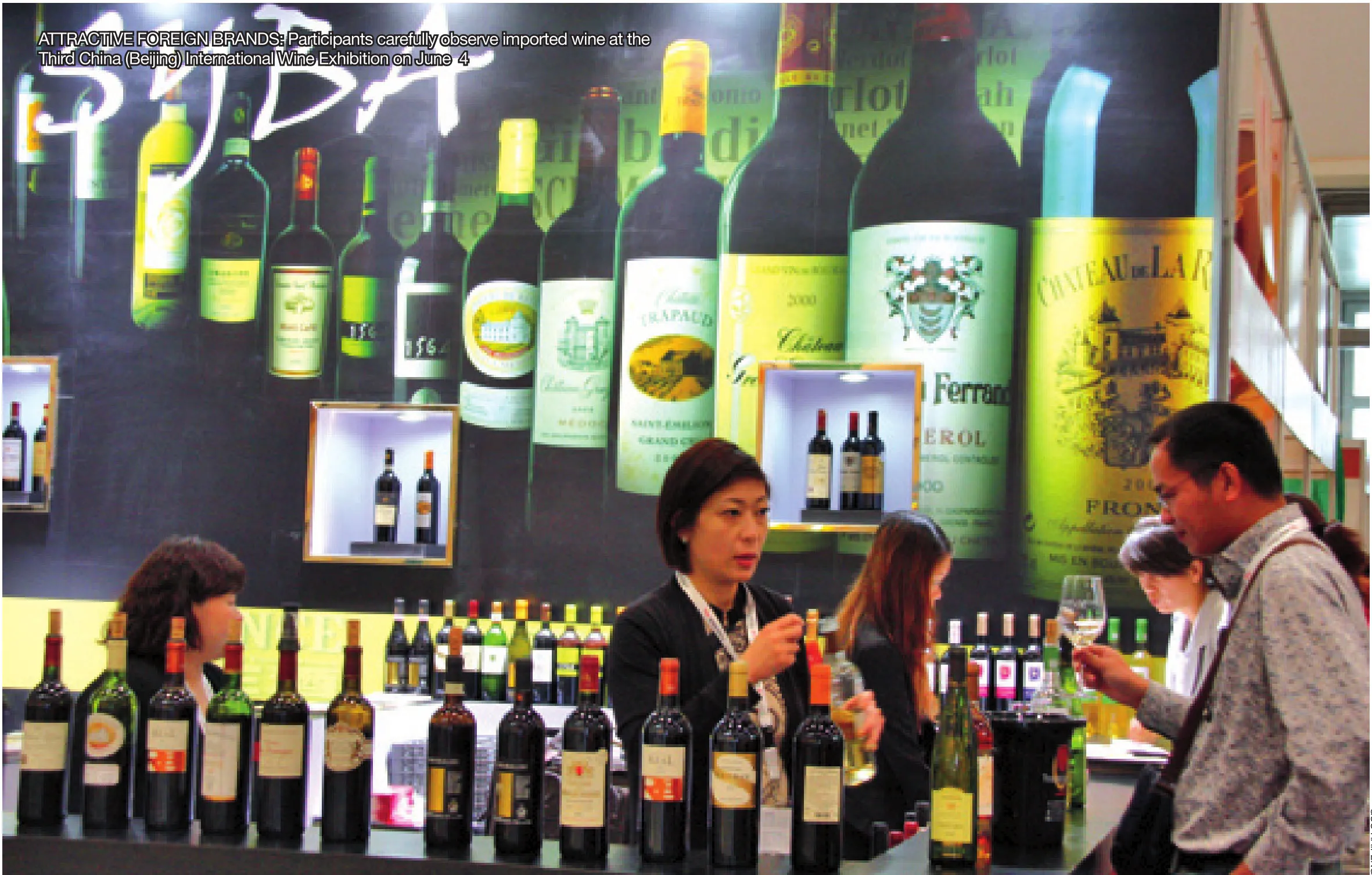Fighting Over a Wine Territory
2012-10-16ChinesewinemakersdemandantidumpingandcountervailingprobeintoEUimportsByZhouXiaoyan
Chinese winemakers demand anti-dumping and countervailing probe into EU imports By Zhou Xiaoyan
Fighting Over a Wine Territory
Chinese winemakers demand anti-dumping and countervailing probe into EU imports By Zhou Xiaoyan
The China Alcoholic Drinks Association (CADA) on August 20 announced that it had filed a complaint to the Ministry of Commerce (MOFCOM), accusing winemakers in the EU of selling their products below market value and receiving unfair government subsidies.
“At the request of domestic winemakers, our association has submitted a petition to the MOFCOM, asking the ministry to launch anti-dumping and countervailing duty investigations on wine imports from the EU,” said Wang Zuming, secretary general of the wine division of CADA.
“CADA has collected evidence through public channels. We have noticed a clear intention to sell European wines in the Chinese market at below-cost price. There is also sufficient evidence to show that the EU has heavily subsidized its wine industry and exporters,” Wang said.
Behind the scenes
The EU is the largest wine-producing region in the world, with an annual output of 16 million tons, accounting for 69 percent of the world output.
With their excessive production capacity and the huge potential of the Chinese market, the reason for EU winemakers to dump their products in China is obvious, said Wang.
EU wine imports surged to 169,114 kiloliters in 2011, from 35,944 kiloliters in 2008, at an annual pace of 67.71 percent. In the past four years, its market share in China increased from 4.94 percent to 14.76 percent. During the first quarter, wine imports from the EU—mainly from France, Spain and Italy—surged by 24 percent from a year earlier, according to CADA.
As foreign wine merchants tap into the Chinese market, local winemakers are starting to feel the pressure. The industry’s average gross margin slipped to 30 percent from around 40 percent, said Sun Fangxun, a statelevel wine appraisal judge .
“Almost all wine enterprises in China have strongly felt the impact of the attack by wine imports from the EU, with operations, performance and market share seriously sliding,” said Wang.
Yantai ChangYu Group Co., a leading domestic wine brand, saw its total business revenue drop 2.51 percent year on year to 3.01 billion yuan ($474.7 million) in the first half of 2012, the first such decline in the past five years, and its sales dropped 5.4 percent.
China Great Wall Wine Co.’s sales dropped 2.1 percent in 2011 from a year earlier. Dynasty Winery, a Sino-French joint venture, saw its revenue shrink 10 percent year on year in 2011.
“With the rising popularity of wine among Chinese consumers, many foreign wine brands including some with shoddy products have entered the Chinese market to reap profits,” said Wang Dehui, a wine marketing specialist at the China Wine Union.
“China’s wine industry is an emerging industry with great potential. The Chinese Government should strengthen the laws and regulations governing the wine industry to help domestic producers improve their competitiveness amid intensifying competition,” Wang said.
Winemakers from the EU made a foray into the Chinese market because of its foreseeable great potential.
As more well-off Chinese can afford wine products, China has become the world’s fifth largest consumer of wine, according to an annual industry study published in February by VINEXPO/International Wine and Spirit Research.

GuO haiPENG
China’s wine consumption surged 28.26 percent to 1.55 million kiloliters in 2011, overtaking the UK as the fifth largest market. Imported wines accounted for nearly one third of the market, up from less than 10 percent in 2006, according to a report by the Xinhua News Agency.
Huang Minghai, director of the press office at the MOFCOM, said on August 20 that the ministry has accepted CADA’s petition but has not decided to launch any probe.
Except for the apparent economic reasons, some also view the move as part of a series of responses to the EU’s possible probe of China’s solar panel exports. The United States and the EU have been aggressive in launching trade probes into Chinese goods amid the global financial crisis but China is learning to fight back, Zhou Shijian, a senior trade expert at Tsinghua University, toldChina Daily. “China is getting wiser and more mature in protecting its own commercial interests under the WTO framework,” he said.
European solar companies recently asked the European Commission to probe Chinese exports to the EU.
China’s wine complaint came soon after its four major solar companies, including New York-listed LDK Solar Co., asked the government to start anti-dumping and anti-subsidy probes into polysilicon exports from the EU on August 17.
Despite the tit-for-tat skirmishes between China and its major trade partners, analysts say full-scale trade wars are unlikely as no one will benefit, especially amid a fragile global economy.
Jonathan Holslag, Research Director at the Brussels Institute of Contemporary China Studies, said trade conflicts are inevitable but a spiral of retaliation is in no one’s interests.
“It is time for China and the EU to sit down to hold candid and straightforward discussions on where we are and where we need to go,” Holslag said.
The future
Whether the appeal is successful, it has a positive significance for China’s domestic wine industry. If it is successful, it can ease the severe competition that homegrown brands are facing. If it fails, it will still mark huge progress for the country. China has gradually learned how to protect its legitimate rights by properly using WTO rules. Even if the appeal fails, it will be a warning for EU wine producers, said Jian Aihua, a research fellow for the food industry at CIConsulting, a Shenzhen-based industrial research institute.
“China’s wine sector is at a starting stage,” said Li Tang, Deputy Secretary General of the Guangdong Alcohol Industry Association (GAIA). “It’s globally acknowledged that vines aged from 30 to 50 years old are the best for producing wine. While Chinese homegrown brands often use vines about 5 years old to produce wine because they can barely find any vines from 30 to 50 years old in the country.”
Domestic brands are generally sold at a lower price. European low-end wine will devastate China’s fledgling wine sector. But high-end wine imports can propel the development of the domestic wine industry. So we should consider giving the green light to highend EU wine imports to benefit homegrown brands, said Zhu Danpeng, an expert in food marketing.
Some domestic brands import foreign substandard wine at a lower price and sell it in the Chinese market at a higher price by claiming it as foreign brands, said Wu Yong, an expert in the wine industry.
“What really matters is the quality of imported wine and CADA should do relevant investigation into this aspect. The quality of wine in the Chinese market should be guaranteed to enable sustainable development,” said Wu.
“Even if we win the WTO complaint and the tariff on wine imports is raised, it’s still a question whether domestic brands can win over the lost market territory because of their limited production capacity. Policymakers might as well start from controlling the quality of wine in the Chinese market. By regulating the lowest quality standard for wine imports, a healthier market can be created,” said Xia Zhongbang, chief representative of Shanghai CWC Wine Co.
“I totally agree with CADA’s petition. China has no subsidy for winemakers and homegrown brands have a high cost and a low profit margin. If the EU offers subsidies to its winemakers, it will be unfair for Chinese winemakers. This must be prohibited,” said Chen Yong, secretary general of the wine division of the GAIA.
“However, even if we win the WTO complaint, the development of domestic wine products will still depend on their quality and competitiveness in the market. Domestic winemakers should have a higher standard for themselves to win over consumers’ trust,” he said.
